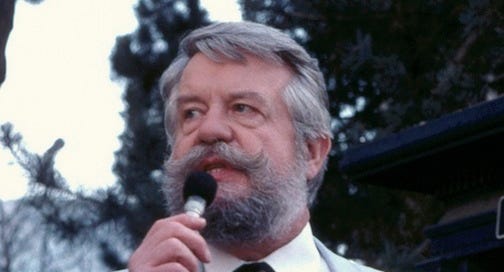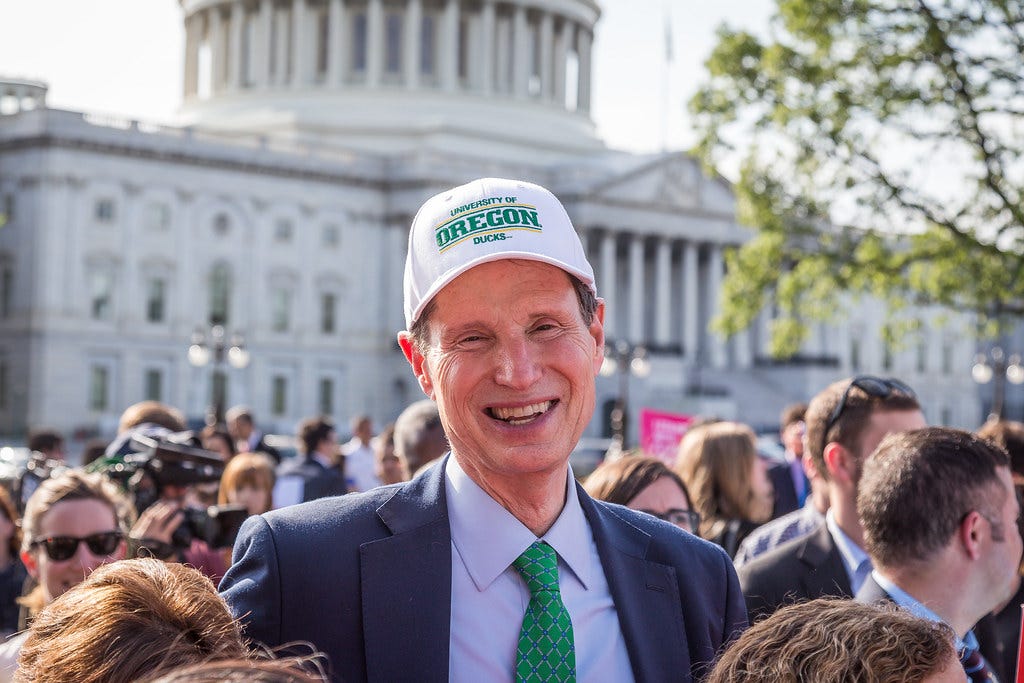The Liftoff: The weirdest story of the week (plus new polling and a billionaire donor)
PLUS: Trump is more popular in Oregon than Brown; bad news for Portland incumbents; Oregon challenges you should care about; goodbye to and Oregon original (whoop whoop!)
Welcome back to The Liftoff!
Thank you for being a reader—we continue to see growth in our subscriber base that is really exciting. We hope you’ll help us grow by forwarding this email to anyone who might benefit from a weekly digest of must-read news and information on Oregon politics.
If you’re ready to take your support to the next level and join our tier of paid members for just $10/month, take two minutes and click the link below.
1. The weirdest story of the week (and the polling analysis you need to understand the Governor’s race)


DHM’s John Horvick is out with a tweet thread that is the most important thing you can read this week to understand the three-way dynamic of the race for Governor.
You can read the full poll results here. The findings are useful not because it shows us what will happen, but because it shows us how each respective campaign will try to frame Betsy Johnson as a candidate (including her own), and the corresponding voter behavior responsive to that message.
Now, the weirdest story of the week: Mayor Stan Pulliam acknowledges being part of a “swinger community” in the past (i.e. he was in an open relationship with his wife). How relevant is a candidate’s personal life to a political campaign? What are Pulliam’s views on LGBTQ+ issues, comprehensive sex education, birth control, etc.? Does this revelation demonstrate hypocrisy (e.g. “small town virtues” running against Portland “squalor”, as the The Oregonian put it)? Expect more discussion in the Oregon political world on these questions in the coming weeks.
Good pre-reading for the Governor’s race: Don McIntosh of NW Labor Press explains why unions (usually) support Democrats. One interesting excerpt: “Last month, when Oregon’s largest union, SEIU, held a candidate forum for governor, Republican candidates were invited, but none showed up.”
Internal polling from the Bud Pierce campaign, first reported by The Oregon Catalyst, shows Pierce with a strong lead in the GOP primary. Pierce is at 20%, Stan Pulliam is at 8%, Kerry McQuisten is at 5%, Christine Drazan is at 4%, and everyone else is under 3%. Pierce benefits from spending millions and traveling thousands of miles as the GOP standard-bearer in 2016.
Pierce answered WW’s questions from last week: yes, Joe Biden won the 2020 election; yes, Pierce still wants Donald Trump to endorse him.
Pulliam, meanwhile, has endorsed the widely disproven claim that the 2020 election was “fraudulent”—and he cast doubt on Oregon’s vote-by-mail system, citing the poor performance of Republican candidates.
Another big endorsement for Tina Kotek: Planned Parenthood PAC of Oregon joined Pro-Choice Oregon PAC and The Mother PAC in supporting Kotek.
This week in Betsy Johnson news:
She was the subject of a glowing profile by Steve Duin.
Some of her Republican endorsers are keeping their options open.
Phil Knight has entered the chat: The Nike founder wrote a $250,000 check to Johnson. Tim Boyle added another $100,000.
2. Rest in Peace to an Oregon Original: Bud Clark (1931-2022)
Legendary former Portland Mayor Bud Clark has passed away. For this millennial politico, who came of age after his tenure as mayor, Clark was in the same category as Tom McCall or Wayne Morse: independent, larger-than-life personalities from an earlier political era that helped define Oregon’s political culture as different than elsewhere (weird, even). Rest in Peace to Mayor Clark.
Here are a couple excerpts from an excellent obit in The O:
But weird oversimplifies a man who was more complex and, in some, ways more conservative. He was a Republican who became a Democrat, but really was a populist who didn’t give a rip about party politics. He was a businessman who took apart budgets and insisted on line-item accountability. He was a Marine, with values of personal duty and civic commitment.
…Clark simply didn’t see differences in status, including his own. He refused a chauffer. He turned out lights at City Hall. One letter writer to The Oregonian saw him stop his bike in the rain to clear a clogged storm drain with his hands.
Before you go, a time capsule from 1984: This profile from WW gives us a glimpse of the pre-mayoralty Clark on the campaign trail. It outlines all of the reasons why he was unlikely to win (he truly was an outsider; he literally had buttons printed that said “Bud Clark is serious”). If you’re feeling nostalgic, take a trip back to Portland in the 80s. Among the gems, there’s this classic quote:
“I’m going to be the salesman for the City of Portland,” he says. “That’s my most important function. The city also needs to have a feeling of pride in the person in office. They need to say, That’s my mayor. That’s Bud Clark.’”
3. What to watch for in the short session
Gov. Kate Brown’s $200 million “Future Ready Oregon” workforce development proposal is attracting the interest of industry groups who say the proposal is too narrowly focused on construction, healthcare, and manufacturing.
Sens. Ron Wyden and Jeff Merkley shot down speculation that a bill in the Oregon legislature has anything to do with them (it would allow the Governor to appoint a new senator in the case of a vacancy, rather than hold a special election).
Forget your preconceived notions about the short session: Tim Nesbitt thinks legislators should think big, not small.
From the Oregonian: “Rep. Janelle Bynum was poised to become Oregon’s first House speaker of color, but a secret nomination process handed the job to someone else”
Rep. Brad Witt is proposing a “luxury sales tax” to fund former foster youth and low-income parents.
Public hearings were held on “heat relief” bills in the first week of session.
Dick Hughes has a full, detailed rundown of the early days of the short session.
4. Angela Wilhelms joins The Bridge and talks manufacturing, why Oregon may have lost out on Intel’s new plant, and what role business plays in society
Born and raised in Klamath Falls, Angela Wilhelms has had a long and diverse career in Oregon politics. After steering away from a projected career in corporate finance and life in the Bay Area, Wilhelms worked on the communications team in D.C for Congressmen Greg Walden. She then returned to her home state and served a seven-year stint as Chief of Staff for former minority leader and Co-Speaker of the House Bruce Hanna.
She also spent some time practicing law in Portland and working at the University of Oregon as the first secretary of the board of trustees, before taking her current position as the leader of Oregon Business & Industry (OBI). With approximately 1,600 members, of which 83 percent represent small businesses, OBI’s members are responsible for the employment of over 250,000 people across Oregon. Angela refers to manufacturing as "the unsung hero" of Oregon's economy.
5. Oregon policy challenges you should care about
Economic Development and Land Use: The story of Governor Brown’s attempt to win Intel’s multi-billion dollar expansion and why Oregon lost out (including a “land use grand bargain” that never materialized).
Environmental Protection and Transportation: How do we protect the Oregon coastline and make sure a crumbling Highway 101 is safe? The Department of Land Conservation and Development is trying to find a way. Meanwhile, Oregon has some bridges that are in bad shape.
Workforce Development: Oregon is facing a steep decline in community college enrollment; the consequences could have a ripple effect in Oregon’s economy for decades.
Education: Astonishingly high numbers of teachers say they will be leaving the profession sooner than they planned (55%), and the Wall Street Journal reports teachers are being welcomed in the private sector with more money and autonomy.
6. Tough polling for Portland incumbents
Incumbent city commissioners Dan Ryan and Jo Ann Hardesty are facing daunting disapproval numbers in a recent poll paid for by the Portland Business Association as they both head into their first re-election. Another stat from the poll, as reported by WW: “Eighty-one percent of Portlanders feel the City Council is ineffective.”
One of Hardesty’s primary opponents, Vadim Mozyrsky, has won the endorsement of two prominent Black leaders in Portland: Portland Public Schools Board Members Gary Hollands and Herman Greene.
Hardesty unveiled some powerful endorsements of her own, including Pro-Choice Oregon PAC, several state legislators, and other community leaders
Mayor Ted Wheeler has banned (via emergency declaration) camping along busy highways and on routes connecting safe rest villages to public transportation stops. His announcement comes on the heels of the news that a disproportionate share of Portlands killed by cars last year were homeless. Some advocates are not happy with the move.
7. OVBC: The impact of geography on political priorities
Thanks to our friends at the Oregon Values and Beliefs Center for this week’s graphic. Again, proof that there is a broad coalition across Oregon’s geographic regions that agrees that homelessness and environmental issues should be priorities for policymakers.
8. News Round-up


For the first time, DHM research shows former President Donald Trump is more favorable in Oregon than Governor Kate Brown.
A deep dive from The O on Brown’s clemency push: “Gov. Kate Brown makes historic push to release prisoners. Crime victims, families feel blindsided.”
Senator Jeff Merkley made quite a stir by blasting U.N. Chief António Guterres for attending the Olympics in Beijing. Many US policy makers are criticizing attendance at the Olympics over human rights concerns.
Proof that some PERS news is good news (market gains wipe out projected cost increases).
Ivory Mathews is the first Black woman to lead Portland’s housing authority, Home Forward.
Mayor Ted Wheeler has added five new staff members.
Some public comments during Portland City Council meetings are out of control and conservative national media outlets are eating it up.
From The Oregonian: “Left Behind: Some Portland teachers embrace proven approach to teaching reading, but most stick with methods that haven’t worked”
Fascinating lede from WW about the appointment of Erious Johnson, Jr.: “The former civil rights chief at the Oregon Department of Justice successfully sued his former agency. Now he’ll preside over its cases.”
Big Business Win For PDX: Cybersecurity start-up and unicorn Orca Security chose Portland for its new headquarters. The company was founded in Israel.
Sea pickles that can grow up to 60 feet are washing up on Oregon’s coast. Yes, you read that right.
A new entrant has joined the race for Oregon’s 6th Congressional District: Carrick Flynn, an attorney and researcher. He joins over a dozen other contenders.
Correction: Last week, we inadvertently referred to the League of Conservation Voters as the League of Conversation Voters. We regret the error, and welcome a conversation-focused PAC into the arena.
Thank you for reading.
Tips? Feedback? Ideas? Corrections? We want to hear from you! Email benjaminwbowman@gmail.com.
If you value this newsletter, please become a paying subscriber today. Your support will help us grow and offer more opportunities to this community. It’s just $10 a month!
Interested in advertising with us? Get in touch!









I really appreciate your blog.